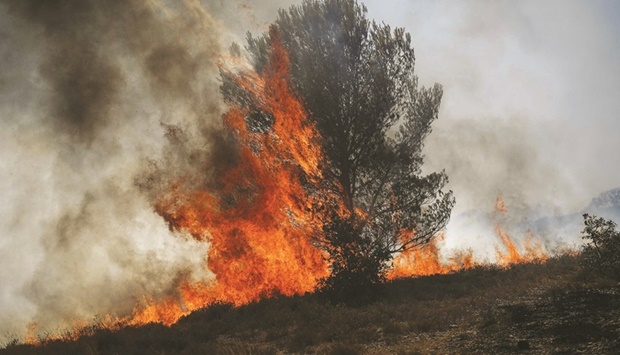Emergency services battled wildfires across swathes of southern Europe amid mass evacuations yesterday, as warnings sounded in London after Britain’s hottest day that the fight against climate change needed to be stepped up.
Hundreds fled in central Italy as gas tanks exploded in a forest fire near the Tuscan town of Lucca. Similar numbers fled in Greece as a blaze fuelled by gale-force winds raged in mountains north of Athens. Greek authorities said later in the day that the blaze had been tamed.
A brutal heatwave with spikes well above 40 Celsius (104F) settled over southern Europe last week, part of a global pattern of rising temperatures, widely attributed by scientists and climatologists to human activity. It is forecast to dump searing heat on much of China into late August.
Power consumption is predicted to hit new peaks in Central US states — adding to greenhouse gas emissions — as homes and businesses crank up air conditioners to combat a heatwave forecast to last into next week.
While the record heat last week around parts of the Mediterranean has eased, mercury readings have begun heading up again in Portugal, Spain and Italy.
Armando Silva, Civil Protection commander in Portugal’s northern region, said rising temperatures and strong winds would make it harder to fight the country’s largest wildfire centred on the municipality of Murça.
It has burned 10,000-12,000 hectares (since Sunday and around 800 firefighters and six water planes have been deployed to tackle it.
In Spain, where emergency crews were fighting fires in five regions, national weather service AEMET also forecast higher temperatures.
Wildfires burned in several areas of Italy, including one that threatened to leave part of the northeastern city of Trieste without power and water, and 14 metropolitan areas including Rome, Milan and Florence were due to be put on the country’s highest heatwave alert today.
Forecasters there said that temperatures were expected to hit 40C across a swathe of the north and centre this week.
The Chief of Science and Technology of Britain’s Met Office, Stephen Belcher, said that unless emissions were reduced, the country might experience similar heatwaves every three years.
Treasury Minister Simon Clarke said Tuesday’s “remarkable, unprecedented” record served as “a reminder ... of the importance of tackling climate change.” British engineers raced yesterday to fix train tracks that buckled in the heat after firefighters worked through the night to damp down wildfires. On Tuesday, London firefighters endured their busiest day since World War Two.
The shift in climate is leading to more wildfires and will force France and the European Union to take “structural decisions...in the years to come”, President Emmanuel Macron said yesterday.
In southern Europe, far larger wildfires continued to rage.
In Italy, emergency crews in Tuscany battled the Lucca wildfire, which forced around 500 people to evacuate as flames reached villages overnight and caused liquefied gas tanks to explode, the region’s governor, Eugenio Giani, tweeted.
Another fire close to the border with Croatia and Slovenia forced state-owned shipbuilder Fincantieri to close down its plant in the port city of Monfalcone, which employs 3,000 people.
As the fire crossed into Slovenia, the mayor of nearby Trieste told local TV that parts of the town could soon stop receiving power, which would shut off the water supply.

